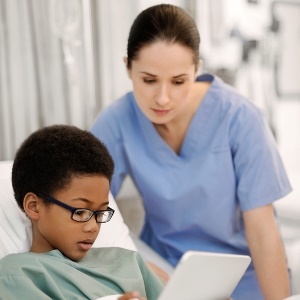
New research presented at this year's World Congress of Anaesthesiologists (WCA) in Hong Kong (Aug. 28–Sept. 2) shows that allowing children to use iPads to distract them before surgery requiring general anaesthesia is as effective at lowering their anxiety as conventional sedatives.
Interactive tools
Furthermore, parental satisfaction and quality of anaesthesia induction was higher in children using iPads. The study is by Dr Dominique Chassard, EPICIME, Hopital Mere Enfant, Hospices Civils de Lyon, Bron, France, and colleagues.
Read: Anaesthesia for kids – parents can relax
Mobile interactive tools have been found to be effective to reduce child anxiety at parental separation in the operating theatre*. The authors' aim in this study was to compare the effects of midazolam (a sedative used regularly before anaesthesia) in premedication with age-appropriate game apps (on an iPad tablet) on children aged 4–10 years during and after ambulatory (day) surgery. Anxiety was assessed both in children and in parents.
Children were randomly allocated to one of the two groups (MDZ [midazolam-54 children] or TAB [iPad - 58 children]). Patients in group MDZ received midazolam 0.3mg/kg orally or rectally, or, in group TAB, were given an electronic tablet (iPAD) 20 min before anaesthesia. Child anxiety (using m-YPAS scale) was measured by two independent psychologists at four time points:
1) at arrival at hospital 2) at separation from the parents 3) during induction and 4) in the post anaesthesia care unit (PACU). Parental (using STAI score) anxiety was measured at the same time points except during induction as they were not present at that point. Anaesthetic nurses ranked from 0 (not satisfied) to 10 (highly satisfied) the quality of induction of anaesthesia.
Read: Anaesthesia-related deaths in kids
Then, 30 minutes after the child received their last dose of nalbuphine anaesthetic or 45 min after arrival in the PACU, the children were transferred to the ambulatory surgery ward where parental anxiety (STAI 3) and children anxiety (m-YPAS 4) were again evaluated for the final time. In addition, parents' satisfaction with the anaesthesia procedure was rated from 0 to 10. Postoperative behaviour changes were assessed with the Post Hospital Behaviour Questionnaire (PHBQ).
Non-pharmacological tool
The researchers found both parental and child anxiety levels to be similar in both groups, with a similar pattern of evolution. Both parents and nurses found anaesthesia more satisfying in the iPad group.
Dr Chassard concludes: "Our study showed that child and parental anxiety before anaesthesia are equally blunted by midazolam or use of the iPad. However, the quality of induction of anaesthesia, as well as parental satisfaction, were judged better in the iPad group. Use of iPads or other tablet devices is a non-pharmacologic tool which can reduce perioperative stress without any sedative effect in paediatric ambulatory surgery.
Read more:
Maternal deaths anaesthesia related
Types of anaesthesia and your choice




 Publications
Publications
 Partners
Partners









